Unit10 知识要点解析
九年级英语上册unit10知识要点
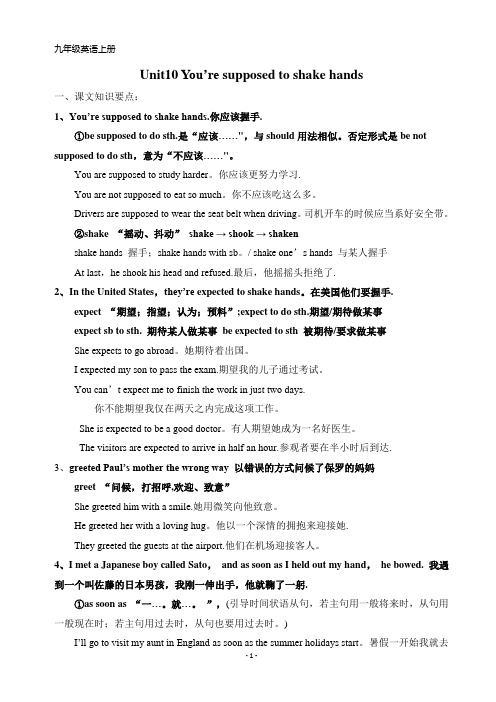
九年级英语上册Unit10 You’re supposed to shake hands一、课文知识要点:1、You’re supposed to shake hands.你应该握手.①be supposed to do sth.是“应该……",与should用法相似。
否定形式是be not supposed to do sth,意为“不应该……"。
You are supposed to study harder。
你应该更努力学习.You are not supposed to eat so much。
你不应该吃这么多。
Drivers are supposed to wear the seat belt when driving。
司机开车的时候应当系好安全带。
②shake “摇动、抖动”shake → shook → shakenshake hands 握手;shake hands with sb。
/ shake one’s hands 与某人握手At last,he shook his head and refused.最后,他摇摇头拒绝了.2、In the United States,they’re expected to shake hands。
在美国他们要握手.expect “期望;指望;认为;预料”;expect to do sth.期望/期待做某事expect sb to sth. 期待某人做某事be expected to sth 被期待/要求做某事She expects to go abroad。
她期待着出国。
I expected my son to pass the exam.期望我的儿子通过考试。
You can’t expect me to finish the work in just two days.你不能期望我仅在两天之内完成这项工作。
She is expected to be a good doctor。
Unit10-If-you-go-to-the-party知识点归纳
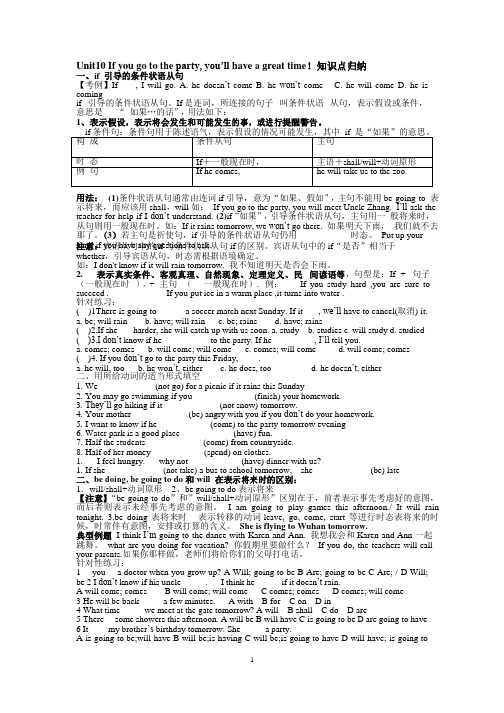
Unit10 If you go to the party, you’ll have a great time !知识点归纳 一、if 引导的条件状语从句【考例】If____, I will go. A. he doesn ’t come B. he won’t come C. he will come D. he is coming if 引导的条件状语从句。
If 是连词,所连接的句子 叫条件状语 从句,表示假设或条件, 意思是 “ 如果…的话”,用法如下:1、表示假设,表示将会发生和可能发生的事,或进行提醒警告。
注意:宾语从句中的 if 与条件状语从句 if 的区别。
宾语从句中的 if “是否”相当于 whether ,引导宾语从句,时态需根据语境确定。
如:I don't know if it will rain tomorrow. 我不知道明天是否会下雨。
2. 表示真实条件、客观真理、自然现象、定理定义、民 间谚语等,句型是:If + 句子 (一般现在时 ),+ 主句 ( 一般现在时). 例: If you study hard ,you are sure to succeed . If you put ice in a warm place ,it turns into water . 针对练习:( )1There is going to ______a soccer match next Sunday. If it ___, we’ll have to cancel(取消) it. a. be; will rain b. have; will rain c. be; rains d. have; rains ( )2.If she ___harder, she will catch up with us soon. a. study b. studies c. will study d. studied ( )3.I don’t know if he __________ to the party. If he _________, I’ll tell you. a. comes; comes b. will come; will come c. comes; will come d. will come; comes ( )4. If you don’t go to the party this Friday, ____. a. he will, too b. he won ’t, either c. he does, too d. he doesn ’t, either 二、用所给动词的适当形式填空1. We ____________ (not go) for a picnic if it rains this Sunday2. You may go swimming if you _____________ (finish) your homework.3. They’ll go hiking if it ____________ (not snow) tomorrow.4. Your mother ____________ (be) angry with you if you don’t do your homework.5. I want to know if he ___________ (come) to the party tomorrow evening6. Water park is a good place ___________ (have) fun.7. Half the students ____________ (come) from countryside.8. Half of her money ___________ (spend) on clothes. 1.- ---I feel hungry. ----why not ___________ (have) dinner with us? 1. If she ____________ (not take) a bus to school tomorrow, she ____________ (be) late 二、be doing, be going to do 和 will 在表示将来时的区别:1.will/shall+动词原形 2、be going to do 表示将来 【注意】“be going to do ”和”will/shall+动词原形”区别在于,前者表示事先考虑好的意图, 而后者则表示未经事先考虑的意图。
unit10知识点讲解

知识点讲解:P63 ,3a:1, or (1) “或者”,连词,用来连接并列的单词或词组,表示选择关系。
Is he your brother or your friend?(2) 在否定句和疑问句中替换and.2, then 然后,He speaks English, and then he plays the piano.3, be in 相当于join, 加入到…中, 成为…中的一员I want to be in the school trip.Tom is in the swimming club.4, call sb. at …P63, 41, show 1) 名词,演出,表演。
school show 学校公演be on show …在展览中The photos are on show.2)动词,给…看,出示show sb. sth. = show sth. to sb.Please show me your watch. = Please show your watch to me.2, do Chinese kung fu 表演中国功夫3, Sunday 星期天,是一周的第一天,在星期天on Sunday;这个星期天this Sunday (之前不加on)4, pm\p.m. 指下午;am\a.m. 指上午,均放在具体时间之后。
P64, 31, May I know your name? 你叫什么名字?(语气更委婉,更有礼貌)= May I have your name? = What’s your name?may 情态动词,可以。
You may go now.2, draw 动词,画画。
draw a cat3, a little (1) 修饰动词,“一点”,放在动词之后,做状语。
反义短语a lot.I know a little/a lot about the boy.(2) 修饰不可数名词,“一些”,放在不可数名词之前。
七年级英语下册unit10知识点

七年级英语下册unit10知识点Unit10是七年级英语下册中的一个重要单元,本单元主要涉及到的内容是形容词比较级和最高级、时间状语从句以及一些有关旅游和交通的话题。
本文将对这些知识点进行详细的介绍和解释。
一、形容词比较级和最高级1.比较级的用法形容词比较级通常用于两个人或物之间的比较。
它的构成方法是在单音节形容词后面加-er,如big-bigger,而对于多音节形容词则需要在前面加more,如beautiful-more beautiful。
除了例外单词(如good-better,bad-worse)外,大部分比较级都需要在后面加than才能完整的表示比较。
2.最高级的用法形容词最高级通常用于三个或以上的人或物之间的比较。
它的构成方法是在单音节形容词后面加-est,如tall-tallest,而对于多音节形容词则需要在前面加most,如interesting-most interesting。
通常来说,最高级也需要在前面加the才能完整的表示最高级。
3.注意点在使用比较级和最高级的时候,我们需要注意以下几点:①要根据句子的语境选择正确的形容词比较级或最高级。
②如果比较级或最高级前面有限定词(如a,an,the等),则需要加在限定词后面。
③在描述人的特征时,注意要表达恰当。
例如正确的表达是Tom is taller than me,而不是Tom is taller than I。
二、时间状语从句时间状语从句通常用于表示某个动作或事件发生的时间。
这类从句可以分为以下几种:1. before/after从句此类从句表示某个动作发生在另一个动作之前或之后,其构成方法如下:before从句:Subject + verb (simple past) + beforeAfter从句:Subject + verb (simple past) + after例如:Before I went to bed, I finished my homework.2. when从句当我们想要表示某个动作的发生时间时,可以使用when从句。
八年级英语上册“Unit 10”必背知识点

八年级英语上册Unit 10 If you go to the party,you'll have a greattime!必背知识点一、重点词汇1. 动词和名词organize (v.) 组织;organization (n.) 组织,机构travel (v.) 旅行;travel (n.) 旅行advise (v.) 劝告,建议;advice (n.) 建议upset (adj./v.) 难过,失望;使心烦意乱experience (n.) 经验;经历(过去式experienced)2. 形容词和副词normal (adj.) 正常的worried (adj.) 担心的careful (adj.) 小心的angry (adj.) 发怒的understanding (adj.) 善解人意的certainly (adv.) 无疑,当然3. 其他meeting (n.) 会议,集会video (n.) 录像带chocolate (n.) 巧克力taxi (n.) 出租汽车teenager (n.) 青少年mistake (n.) 错误二、重点短语1. 动词短语have a great time 玩得开心order food 订餐stay at home 呆在家watch a video 看录像make mistakes 犯错误travel around the world 周游世界give sb. advice 给某人建议solve the problem 解决问题cut ... in half 把……切成两半2. 介词短语have problems with ... 在……方面有问题be worried about ... 为……担心keep ... to oneself 保守秘密be angry with ... 对……生气have enough time to do sth. 有足够的时间做某事3. 其他常用短语too ... to ... 太……而不能……in the end 最后,终于step by step 一步一步地half the class 一半的学生三、重要语法1. 条件状语从句当主句用一般将来时时,从句用一般现在时表示将来。
人教版英语八年级unit10知识点全解
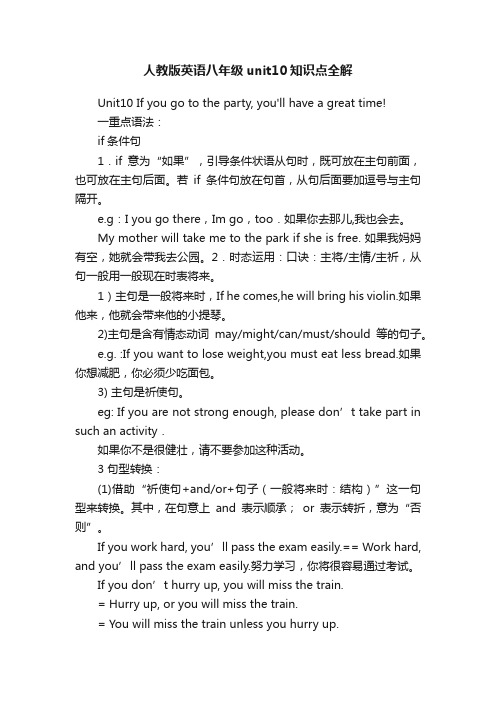
人教版英语八年级unit10知识点全解Unit10 If you go to the party, you'll have a great time!一重点语法:if条件句1.if意为“如果”,引导条件状语从句时,既可放在主句前面,也可放在主句后面。
若if条件句放在句首,从句后面要加逗号与主句隔开。
e.g:I you go there,Im go,too.如果你去那儿,我也会去。
My mother will take me to the park if she is free. 如果我妈妈有空,她就会带我去公园。
2.时态运用:口诀:主将/主情/主祈,从句一般用一般现在时表将来。
1)主句是一般将来时,If he comes,he will bring his violin.如果他来,他就会带来他的小提琴。
2)主句是含有情态动词may/might/can/must/should等的句子。
e.g. :If you want to lose weight,you must eat less bread.如果你想减肥,你必须少吃面包。
3) 主句是祈使句。
eg: If you are not strong enough, please don’t take part in such an activity.如果你不是很健壮,请不要参加这种活动。
3 句型转换:(1)借助“祈使句+and/or+句子(一般将来时:结构)”这一句型来转换。
其中,在句意上and表示顺承;or表示转折,意为“否则”。
If you work hard, you’ll pass the exam easily.== Work hard, and you’ll pass the exam easily.努力学习,你将很容易通过考试。
If you don’t hurry up, you will miss the train.= Hurry up, or you will miss the train.= You will miss the train unless you hurry up.如果你不快点,你会错过火车。
Unit10九年级知识点
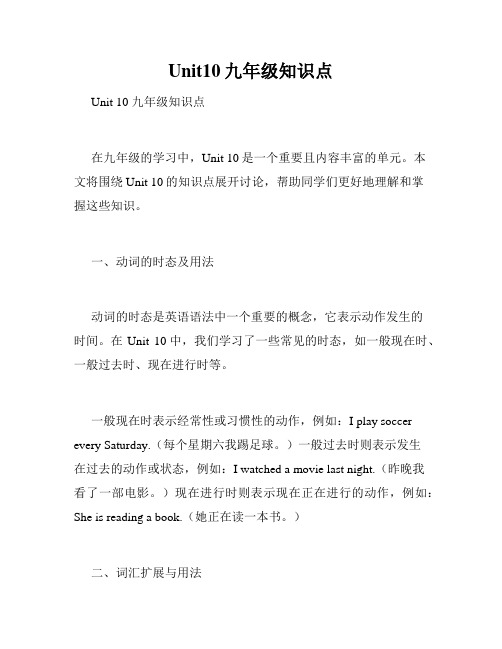
Unit10九年级知识点Unit 10 九年级知识点在九年级的学习中,Unit 10是一个重要且内容丰富的单元。
本文将围绕Unit 10的知识点展开讨论,帮助同学们更好地理解和掌握这些知识。
一、动词的时态及用法动词的时态是英语语法中一个重要的概念,它表示动作发生的时间。
在Unit 10中,我们学习了一些常见的时态,如一般现在时、一般过去时、现在进行时等。
一般现在时表示经常性或习惯性的动作,例如:I play soccer every Saturday.(每个星期六我踢足球。
)一般过去时则表示发生在过去的动作或状态,例如:I watched a movie last night.(昨晚我看了一部电影。
)现在进行时则表示现在正在进行的动作,例如:She is reading a book.(她正在读一本书。
)二、词汇扩展与用法扩充词汇量对于提高英语表达能力非常重要。
Unit 10中,我们学习了一些与旅行相关的词汇,如passport(护照)、destination (目的地)、tourist(游客)等。
掌握这些词汇不仅可以帮助我们更好地理解和阅读英语材料,还能够使我们在旅行中更加流利地交流。
此外,我们还学习了一些常用的短语和表达方式,如keep in touch(保持联系)、have a good time(玩得开心)等。
这些短语和表达方式可以在日常生活和交流中派上用场。
三、被动语态的构成及用法被动语态是英语中的一个重要句式,它用于强调动作的接受者而不是执行者。
在Unit 10中,我们学习了被动语态的构成及用法。
被动语态的构成通常由助动词be加上动词的过去分词形式而成,例如:The book was written by Mark Twain.(这本书是马克·吐温写的。
)被动语态常用于句子中缺少执行者的情况,或者强调动作的接受者的重要性。
四、连词的使用连词在英语中连接或者分割句子,使语言更加流畅。
九年级u10知识点
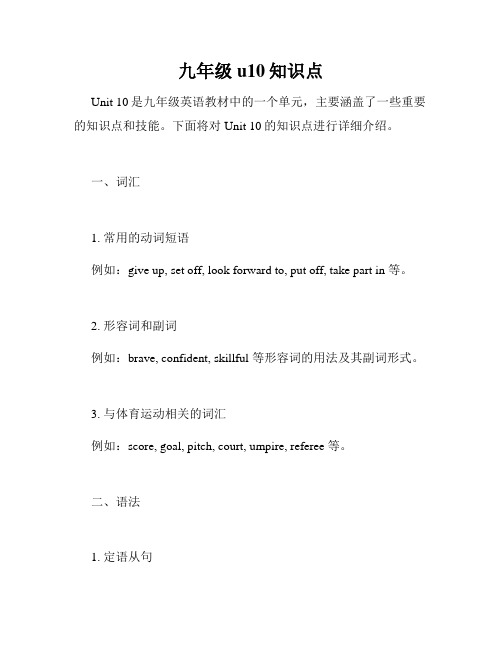
九年级u10知识点Unit 10是九年级英语教材中的一个单元,主要涵盖了一些重要的知识点和技能。
下面将对Unit 10的知识点进行详细介绍。
一、词汇1. 常用的动词短语例如:give up, set off, look forward to, put off, take part in 等。
2. 形容词和副词例如:brave, confident, skillful 等形容词的用法及其副词形式。
3. 与体育运动相关的词汇例如:score, goal, pitch, court, umpire, referee 等。
二、语法1. 定语从句定语从句是一个非常重要的语法结构,它可以修饰名词,并且在句中起到进一步限制或说明的作用。
在定语从句中,我们需要学会选择适当的关系代词或关系副词,并了解其用法。
2. 状语从句状语从句是一个从句,用来修饰句子中的动词、形容词或副词,来表达时间、条件、原因、目的、方式等各种状况。
在学习状语从句时,需了解不同类型的状语从句的使用方法。
3. 被动语态被动语态是英语中常用的一种语态,通过被动语态可以更准确地表达一个动作或事件的发生。
在学习被动语态时,需要掌握其构成、变换方式以及适当的使用场景。
三、阅读理解Unit 10中的阅读理解部分包含了一些关于体育运动、运动员以及运动故事的文章。
学生需要仔细阅读并回答问题,培养他们的阅读理解能力。
四、写作技巧Unit 10中的写作技巧部分主要培养学生撰写与体育相关的文章的能力。
学生需要学会如何运用所学词汇和语法知识,以及如何组织内容,写出连贯、准确的英语短文。
五、口语交际在Unit 10中,学生将通过各种情境对话来进行口语交际。
通过模仿和角色扮演的方式,提高学生的口语表达能力,并培养他们在实际交际中使用所学知识的能力。
六、听力训练Unit 10中的听力训练部分旨在让学生提高听力理解能力。
学生将聆听各种对话和短文,然后完成相关的练习,以检验他们对所听内容的理解程度。
- 1、下载文档前请自行甄别文档内容的完整性,平台不提供额外的编辑、内容补充、找答案等附加服务。
- 2、"仅部分预览"的文档,不可在线预览部分如存在完整性等问题,可反馈申请退款(可完整预览的文档不适用该条件!)。
- 3、如文档侵犯您的权益,请联系客服反馈,我们会尽快为您处理(人工客服工作时间:9:00-18:30)。
• be worth doing sth 值得做某事,句子主语一般事或物,是do的宾语 • be worth +钱 “值多少钱” • be worth +名词 “值得” • well worth ‘很值得’,不能说 very worth • 【练一练】
_________(握手)with them. • ②当第一次见朋友是,你们应该握手。 • You’re ________ to shake ______ (hand) when you meet your
friends.
3.In the United States, they’re expected to shake hands. 在美国,他们应该握手。
11.If there are people in the meeting room , you are supposed to knock before entering .
• knock v. 敲(门等), 碰撞 • knock at/on the door 敲门 knock into 与......相撞 knock down 撞倒 • 【练一练】用介词at/on,into,down填空 • 1)He knocked ______ the door , but no one answered. • 2)The car knocked ________ the tree last night and the driver hurt. • 3)The boy was knocked ________ by a running bike on the street.
tired.
7.We often just drop by our friends’ homes if we have time.如果我们有时间,我们经常回顺便拜 访朋友家。
• 【解析】 drop by 顺便拜访 可以直接使用,也可以在by后面 drop in on sb. 顺便走访某人= drop by sb.
6.If you tell a friend you’re going to their house for dinner, it’s OK if you arrive a bit late.
• 【拓展】a bit / a little辨析: • 【相同点】a bit 和a little作程度副词修饰形容词、副词、动词或
等开始之初】 • (2) first of all 首先,第一【表明陈述事情的重要性】 • 【练一练】
• (1 ) Do you remember the day when we met for the ___ time? • A. first B. one C. once D. firstly • (2 )他第一次被父母赞扬。这使得他很兴奋。 • He was praised by parents _____ _____ _____ _____. This made her very
• drop in at +地点 = drop by one’s home 拜访…
• 【练一练】
• ① When I return to my hometown, I usually ______________(顺便看望) my old friends.
• ② — Do you often _____your friends’ homes? — Yes, we do
时则相当于not much。
• 【练一练】
• ①. There is _________ time left. • ②. I would like you to stay for _________ if you have time. • ③. This will give us a _________ of time. • *④. He went to sleep soon, for he was not _________ tired. • *⑤. I don't want to stop to have a rest, because I am not _________
• 【解析】greet v.“问候,打招呼”= welcome or say “hello”to • greet sb.with 用....方式向某人问候 greet sb by doing sth 通过做......
问候某人 • 【练一练】 • ①她向我微笑致意。 • She _____me_____ a friendly smile. • ②The girl often greets me _____ a polite nod. • A in B by C with D to
比较级时,意义相同,为“一点儿, 有些”。 • 【不同点】a little可直接修饰名词;而a bit后须加of才可以。 • *否定形式: • not a little 作状语,相当于very / quite, “很, 非常”;作定语和
宾语时,相当于much, 意为 “许多”。 • not a bit 作状语时,相当于not at all, 意为“一点也不”,作宾语
classroom.” “Sorry, sir.” • A. are supposed to B. are surprised to C. are afraid to D are suppose to
• 【解析2】for the first time 首先,第一次 • 【辨析】at first/first of all • (1) at first = at the beginning 最初,开始 【强调在时间顺序或做某事过程
• Workers are_____ _____shut off the machine after work. • ③I expect the group ________(sing) pop songs.
4. greeted Paul’s mother the wrong way 以错误 的方式问候了保罗的妈妈。
homework.
• A. surprised at B. mad at C. excited at • ②老师对我的谎言很生气。
• Teacher was _____ ______ my lies.
10. but it is worth the trouble if you want to understand another culture.但是如果你想理解另 外一种文化,这样的麻烦是值得的。
• 【解析】sb. be expected to do sth.“(某人)被期待做某事,应该做某事 (相当于be supposed to do sth.)”
• 【回顾】expect v预料,期待,期望。 后面接名词,代词或不定式,从句 及以下搭配
• (1) expect to do sth = look forward to doing sth 期待做某事 • (2) expect sb. to do sth 期待某人做某事 • 【拓展】wish , hope和expect 搭配 • ①The boy is expected_______(say) sorry to his mother because of his mistake. • ②工人应该下班后关闭机器。
• A. going B.going by C. going for
9.If you’re even 15 minutes late, your friend may get mad. 如果你迟到15分钟,你的朋友或许会 生气。
• 【解析】get mad 大动肝火;气愤 • 【拓展】mad adj. 很生气;疯的 • be/get mad at/with sb.= be /get angry with sb. 对某人生气 • be/get mad about sth.因某事而生气 • 【练一练】 • ①My mother is angry with me because I didn’t finish the
1.In your country, what are you supposed to do when you meet someone for the first time?
• 【解析】be supposed to do sth. “被期望做某事,应该做.....”表示劝告、 建议、责任等,=should,后接动词原形
• A. drop by B. drop off C. drop at D. drop on
• ③ I often drop ________ my uncle’s home.
• A. by
B. over
C. in
D. in
8. Also, we never visit a friend’s house without calling first.而且,我们从不未通电话便拜访朋 友家
• 【解析】 without prep.无,没有(后跟名词,代词或动词ing) • 【2014福州中考】Don’t go to school _____ breakfast .It’s a bad
habit.
• A. after B. with C. without
• 【2014甘肃白银】Mom always tells me that nothing can be learned without_______through hard work.
• ①. The TV program Super Brain(最强大脑)is so fantastic that it is well worth____ ____ ( watch).
• ②.你给我的这本书非常值得再看一遍。
• The book you gave you is____ _____ _____ again.
